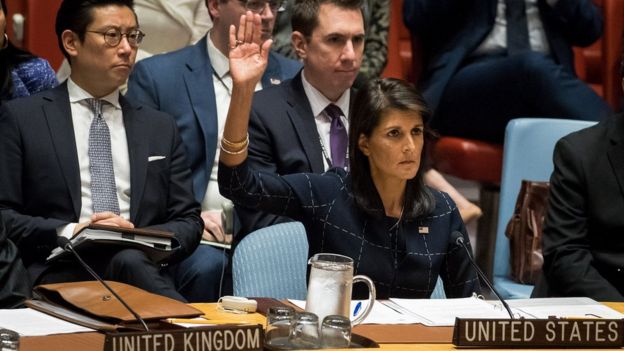North Korea threatens US with 'greatest pain' after UN sanctions
Pyongyang's envoy to the UN accused Washington of opting for "political, economic and military confrontation".
US President Donald Trump said the move was nothing compared to what would have to happen to deal with North Korea.
The UN sanctions are an attempt to starve the country of fuel and income for its weapons programmes.
The measures restrict oil imports and ban textile exports, and were approved after North Korea's sixth and largest nuclear test earlier this month.
Han Tae Song, North Korea's ambassador to the UN, said he "categorically rejected" what he called an "illegal resolution".
"The forthcoming measures by DPRK [the Democratic Republic of Korea] will make the US suffer the greatest pain it has ever experienced in its history," he told a UN conference in Geneva.
"Instead of making [the] right choice with rational analysis... the Washington regime finally opted for political, economic and military confrontation, obsessed with the wild dream of reversing the DPRK's development of nuclear force - which has already reached the completion phase."
The resolution was only passed unanimously after North Korea's allies Russia and China agreed to softer sanctions than those proposed by the US.
The initial text included a total ban on oil imports, a measure seen by some analysts as potentially destabilising for the regime.
The new sanctions agreed by the UN include:
- Limits on imports of crude oil and oil products. China, Pyongyang's main economic ally, supplies most of North Korea's crude oil
- A ban on exports of textiles, which is Pyongyang's second-biggest export worth more than $700m (£530m) a year
- A ban on new visas for North Korean overseas workers, which the US estimates would eventually cut off $500m of tax revenue per year
A proposed asset freeze and a travel ban on North Korean leader Kim Jong-un were dropped.
Reacting on Tuesday, Mr Trump said: "We think it's just another very small step, not a big deal.
"I don't know if it has any impact, but certainly it was nice to get a 15 to nothing vote. But those sanctions are nothing compared to what ultimately will have to happen," he added, without giving details.
The US ambassador to the UN Nikki Haley, told the Security Council after the vote: "We don't take pleasure in further strengthening sanctions today. We are not looking for war."
"The North Korean regime has not yet passed the point of no return," she added. "If North Korea continues its dangerous path, we will continue with further pressure. The choice is theirs."
A South Korean presidential office spokesman said on Tuesday: "North Korea needs to realise that a reckless challenge against international peace will only bring about even stronger sanctions against them."
Monday's resolution was the ninth one unanimously adopted by the UN since 2006.
What have previous sanctions achieved?
- 30 November 2016: UN targeted North Korea's valuable coal trade with China, slashing exports by about 60% under a new sales cap. Exports of copper, nickel, silver, zinc and the sale of statues were also banned.
- What happened next? On 14 May 2017, North Korea tested what it said was a "newly developed ballistic rocket" capable of carrying a large nuclear warhead.
- 2 June 2017: UN imposed a travel ban and asset freeze on four entities and 14 officials, including the head of North Korea's overseas spying operations.
- What happened next? On 4 July, North Korea claimed it carried out its first successful test of an intercontinental ballistic missile (ICBM).
- 6 August: UN banned North Korean exports of coal, ore and other raw materials and limited investments in the country, costing Pyongyang an estimated $1bn - about a third of its export economy.
- What happened next? On 3 September, North Korea said it tested a hydrogen bomb that could be miniaturised and loaded on a long-range missile.
North Korea's missile programme
What we know about North Korea nuclear test site
How advanced is North Korea's nuclear programme?

China's foreign ministry said on Tuesday (link in Chinese) that North Korea had "ignored international opposition and once again conducted a nuclear test, severely violating UN Security Council resolutions".
It also repeated its call for a "peaceful resolution" instead of a military response, adding: "China will never allow the peninsula to descend into war and chaos."
The BBC's China editor Carrie Gracie says Beijing is treading a fine line and wants sanctions tough enough to signal its displeasure to Pyongyang and avoid American accusations of complicity, but not so tough as to threaten North Korea's survival.
Both Russia and China reiterated their proposal that the US and South Korea freeze all military drills - which anger North Korea - and asked for a halt in the deployment of the controversial anti-missile system Thaad, in exchange for Pyongyang's cessation of its weapons programmes.
Beijing believes Thaad, which employs a powerful radar, is a security threat to China and neighbouring countries.
Ms Haley last week dismissed this proposal as "insulting".
[BBC SOURCES]


No comments